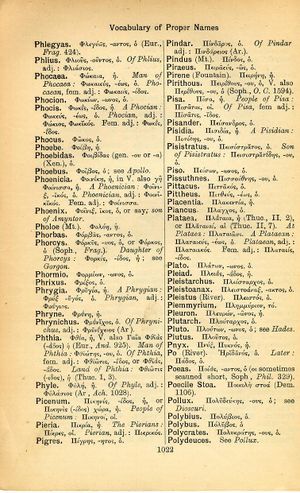Pittacus
Τίς, ξένος ὦ ναυηγέ; Λεόντιχος ἐνθάδε νεκρὸν εὗρέ σ᾿ ἐπ᾿ αἰγιαλοῦ, χῶσε δὲ τῷδε τάφῳ, δακρύσας ἐπίκηρον ἑὸν βίον· οὐδὲ γὰρ αὐτὸς ἥσυχος, αἰθυίῃ δ᾿ ἶσα θαλασσοπορεῖ. → Who art thou, shipwrecked stranger? Leontichus found thee here dead on the beach, and buried thee in this tomb, weeping for his own uncertain life; for he also rests not, but travels over the sea like a gull.
English > Greek (Woodhouse)
Πιττακός, ὁ.
Latin > English (Lewis & Short)
Pittăcus: or -os, i, m., = Πιττακός,
I one of the seven wise men of Greece, from Mitylene, in Lesbos, Aus. Sept. Sap.; Cic. de Or. 3, 15, 56; id. Leg. 2, 26, 66; Nep. Thras. 4, 2; Juv. 2, 6.
Latin > French (Gaffiot 2016)
Pittăcus¹⁵ (-ŏs), ī, m. (Πιττακός), de Mitylène, un des sept sages de la Grèce : Cic. de Or. 3, 56 ; Nep. Thras. 4, 2 ; Juv. 2, 6.
Latin > German (Georges)
Pittacus u. -os, ī, m. (Πίττακος), Philosoph zu Mitylene, einer der sieben Weisen, Cic. de or. 3, 56. Nep. Thras. 4, 2. Iuven. 2, 6.

